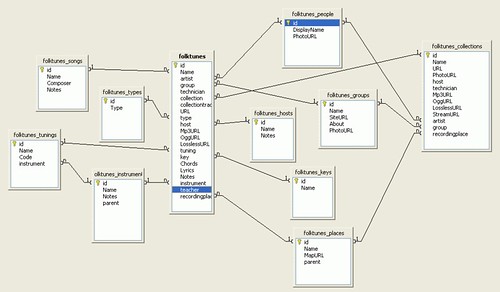Migrating Business Systems to the Digital Archives (a post from the Digital Archives team) June 17, 2013 8 Comments
One of the challenges that we (State Records NSW’s digital archives team) have been tackling is how we will approach the migration of database-backed business systems to the digital archives.
There are a number of difficulties in preserving databases:
- many database management systems (particularly those used in government) are proprietary and require licenses to use, so transformation to non-proprietary formats is often necessary
- most databases are uniquely configured to support a particular application, which makes it hard to find an appropriate ‘one size fits all’ solution, even for a single database type
- databases often fulfil a number of roles (which makes associating them with particular disposal classes or series/item descriptions difficult) and are associated with a variety of views (which makes it hard to identify singular, canonical records)
- most databases don’t stand alone, but are part of larger business systems. Database-backed business systems also comprise custom application code that defines the way data is manipulated and viewed.
But the fact that preserving database-backed business systems is hard doesn’t mean that we can avoid the challenge. NSW government agencies expect us to have a capacity to accept migrations of business systems to the digital archives. In the series of pilot migrations that we are currently conducting, one of the lessons that we have learned is that, while agencies are often largely content to manage their legacy unstructured data (emails, documents, spreadsheets, images, etc.) for long periods of time, it is much harder to maintain redundant business systems and it is these types of digital records that agencies most want to transfer. Read the rest of this entry »
Ancient advice on email management June 12, 2013 2 Comments
In recent weeks we have been sharing our current thoughts about email management but in this post we want to go back in time!
Way back in 2008, State Records developed some advice on email management. We have reproduced this advice below and we would love to receive your feedback on it.
Which of our recommendations from 2008 failed dismally when you tried them? Alternatively, did any of our advice help you to win some email battles? Does any of this advice stand the test of time or have you come up with new and improved ways for managing your corporate email? Are any examples below still useful, or what extra advice or case studies or scenarios would be helpful to include in new cutting edge email advice ?
We are currently trying to revise and update our advice on email management and we want to draw on all the advice and expertise we can. Read the rest of this entry »
Happy International Archives Day! June 8, 2013 No Comments

http://www.flickr.com/photos/kalexanderson/6060432934/in/set-72157627289617985
Sunday June 9 is International Archives Day. Happy Archives Day everyone!
Email messages have corporate value to organisations but are still tricky to manage – latest State Records survey results May 30, 2013 2 Comments
As mentioned in our last post, State Records is researching the ways in which NSW public offices manage their email. This research is part of a review of our advice in this area, some of which is more than ten years old. One of the aims of the review is to ensure that our advice on email management is informed by the perspectives and experiences of public offices, and reflects and addresses the email management issues that public offices want advice on.
As part of our research State Records recently invited NSW public offices to complete a short survey on email management practices in their organisations. The results confirm some of our suspicions, but also challenge some long held assumptions. Read the rest of this entry »
Information management and governance issues to consider when moving your corporate email to the cloud May 29, 2013 2 Comments

http://www.flickr.com/photos/mnsc/2768391365/
For Information Awareness Month with its theme of better information = better business, we want to do a post on managing your information better in the cloud.
We are being contacted by a lot of government organisations who are wanting to move their email systems to the cloud.
Moving your email or any other business system to the cloud is a business decision and there are no legal impediments under the State Records Act to prevent you from doing this.
You do however have to make an informed decision with a full awareness of all potential risks and mitigation strategies to prevent these. In talking to government agencies moving to the cloud we are finding that they are doing excellent risk assessments to combat a lot of potential security, privacy and technical problems, but they are not asking a lot of questions about the potential information risks they might face.
Here are some pointers for building information risk assessments into your cloud email discussions.
To analyse business processes, or not to analyse business processes – that is the question (or at least one of the questions to consider when implementing an EDRMS) May 22, 2013 1 Comment
Last week the members of the EDRMS Implementers Discussion Group met to talk about establishing business rules as part of an EDRMS implementation. Members shared the different approaches taken by their organisations to determine when records will be captured to the EDRMS (e.g. when initially drafted? when approved or finalised?), how they will be captured (e.g. manually by creators? as part of a workflow?) and by whom (e.g. creators? reviewers? approvers?)
The discussion raised a very interesting issue: successful EDRMS implementations are linked to having a good understanding of an organisation’s business needs for information. Detailed business process analysis can determine where records are created or received in a specific business process and when, how and by whom these records should be captured. However in the ‘real world’, especially for large organisations subject to frequent change and re-organisation, this type of analysis isn’t always possible. These organisations may only be able to develop generic business rules for when records should be captured and leave it up to individual business units to interpret and adjust these with regard to their own business processes. Read the rest of this entry »
Digital recordkeeping Q&A at State Records NSW in March and April 2013 May 2, 2013 2 Comments
As usual, Government Recordkeeping staff have been asked lots of interesting questions about digital information management and recordkeeping issues in March and April.
Here is a sample of some of these questions and our responses.
Link to business, train staff, integrate – more suggestions for implementing an EDRMS May 1, 2013 No Comments

http://www.flickr.com/photos/missmoon/18350123/
In the lead up to our next EDRMS implementer’s discussion group meeting later this month, here are some more electronic document and records management systems (EDRMS) implementation strategies that we have been discussing with an agency currently starting off their implementation project. Read the rest of this entry »
Systems are records of how we do business: managing the information about your business system, not just the information in your business system April 29, 2013 No Comments

http://www.flickr.com/photos/forresto/8956688/
We have been having some really interesting conversations with a range of organisations about their business systems and the types of records they are making and keeping about their business systems. Read the rest of this entry »
NSW government establishes Community of ICT Professionals April 9, 2013 No Comments

http://www.flickr.com/photos/powerhouse_museum/3403199011/in/photostream/
The NSW Government is establishing a brand new Community of ICT Professionals to:
- disseminate information of interest and relevance to all NSW ICT professionals
- promote case studies of innovative ICT practice
- generate new ideas for ICT innovation
- help create an informed ICT workforce
Membership is open to all NSW Public Sector employees working in any area of ICT. We strongly encourage all NSW Government-based readers of Future Proof to join. The Community will provide a fantastic opportunity to learn, share insights and collaborate with colleagues working in all areas of NSW Government ICT. Read the rest of this entry »





